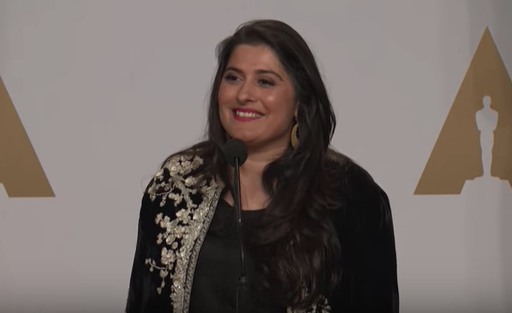Anger is complicated territory for women. Displaying a trace of irritability—nevermind fury — means running the risk of being called imbalanced or irrational. Yet anger is also a useful, powerful emotion, as the Women’s March, #MeToo, and #TimesUp have proven, one that can motivate and inspire change.
This is why Sharmeen Obaid-Chinoy prizes anger in her work as a documentarian. “Anger is necessary for people to go beyond not liking what they see,” the Pakistani filmmaker explained in a New Yorker profile. “I need enough people who watch my stuff to be moved, and to be angry, and to do something about it.”
Obaid-Chinoy’s films tend to focus on the havoc patriarchies wreak. Her two Oscar-winning short docs, “A Girl in the River: The Price of Forgiveness” and “Saving Face,” follow female survivors of attempted honor killings and acid attacks, respectively. Honor killings are ritual murders of women who have “dishonored” their family in some way (having premarital sex, entering into a forbidden relationship, etc.), while acid attacks are often doled out to women by their husbands, lovers, or exes — so it’s not hard to imagine these stories stoking viewers’ anger.
Even so, audiences do not always side with the women of Obaid-Chinoy’s films. She revealed that men often cheer for the protagonist’s father, the person attempting the honor killing, at screenings of “A Girl in the River” in Pakistan. Yet the director refuses to be discouraged. “You have to keep shining a light on things, even if nobody changes their mind while watching the film,” she said. “There will be somebody who will think twice about what a woman goes through, or about killing a woman.”
In her early work Obaid-Chinoy often appeared on-screen in her documentaries, as did her emotions. “You can tell when I’m upset. You can tell how my voice changes depending on who I’m talking to,” she explained.
According to Obaid-Chinoy, she first became conscious of her anger, as well as the patriarchy and its treatment of women, during childhood. “I realized that we accept things for women because that’s just the way they are,” she recalled. “It made me question what my rights are, and what I will be ‘allowed’ to do. And that became such a troubled word for me. Why should I be ‘allowed’ to do something?”
The filmmaker has not stopped questioning the status quo or demanding a better life for women. She founded SOC Films in 2011, and the production company brings on recent college grads to help develop films that inform Pakistani women of their rights in situations such as divorce, sexual harassment, or property inheritance. Obaid-Chinoy also made Pakistan’s first full-length animated film with 2015’s “3 Bahadur.” She now runs her own animation studio.
Obaid-Chinoy won Emmys for “Saving Face” and working on episodes of “Frontline/World” and “Dispatches.” Her feature docs include “Song of Lahore” and “A Journey of a Thousand Miles: Peacekeepers.” She recently completed the documentary short “Freedom Fighters,” which centers on three female activists fighting for gender equality.







